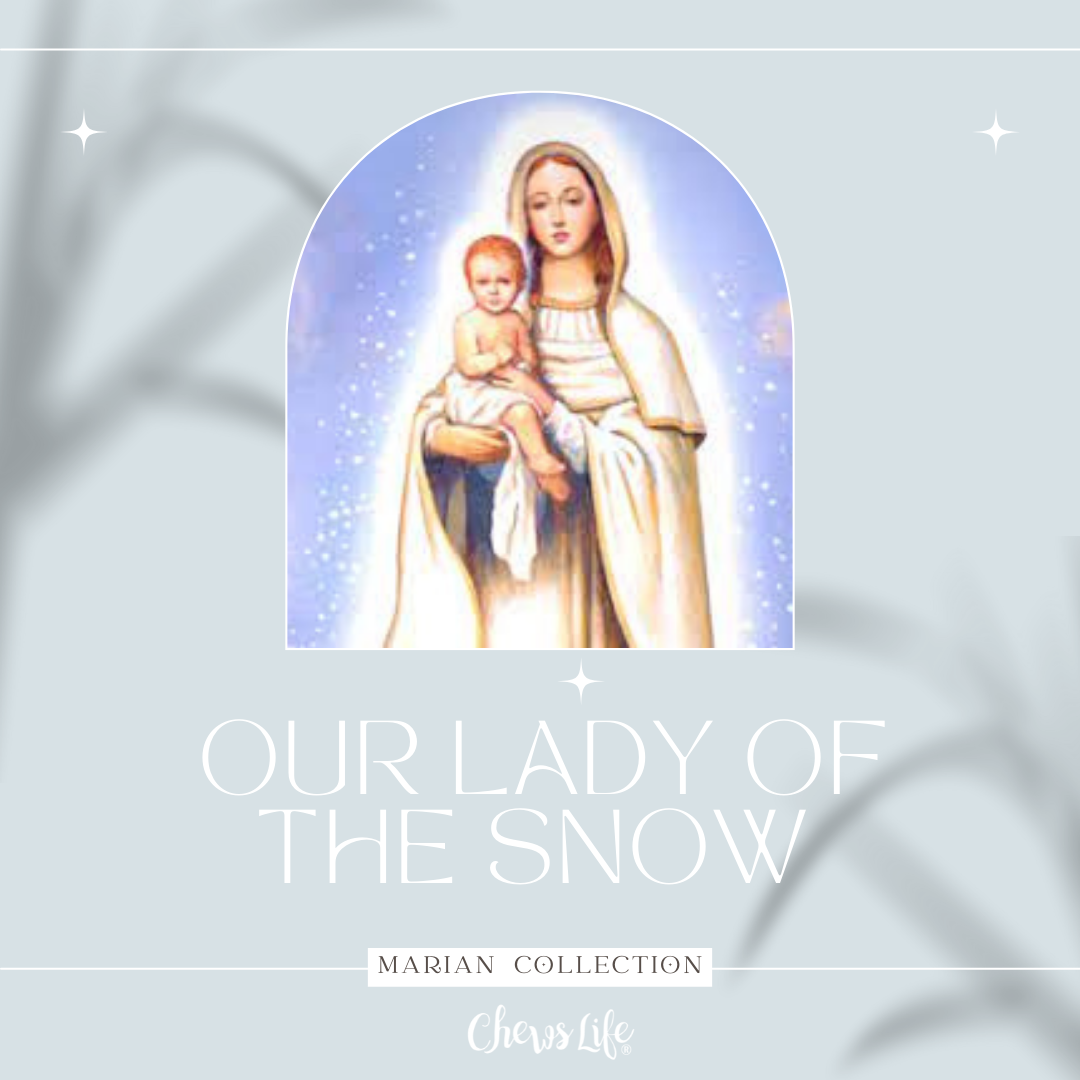Advent Week 2: Dec. 4-10
The Sorrowful Mysteries
“Advent’s intention is to awaken the most profound and basic emotional memory within us, namely, the memory of the God who became a child. This is a healing memory; it brings hope. The purpose of the Church’s year is continually to rehearse her great history of memories, to awaken the heart’s memory so that it can discern the star of hope.” ~ Pope Benedict XVI
As we journey through Advent, we are renewing our commitment to pray the Rosary, as a way to refocus our minds on Christ’s life, and prepare our hearts to celebrate his coming at Christmas, and our hopeful expectation of his return. At Chews Life, our mission is to equip all Catholics with rosaries for life. This week, we are focusing on the Sorrowful Mysteries of the Rosary—Christ’s passion and death. We remember the suffering he endured out of love for each one of us. Christ was born and placed in a crib in order that he might fulfill his mission on the cross. As we sit with these mysteries this week, may we remember that great love that is both personal and powerful—more powerful than death.
(If you have never prayed the rosary before, or it has been some time since you have, do not let that stop you! Our downloadable and FREE How to Pray the Rosary guide is available for anyone who wishes to learn how to pray this beautiful prayer.)
First Sorrowful Mystery: The Agony in the Garden
Fruit of the Mystery: Conformity to God’s Will // Sorrow for Sin
"Then Jesus went with them to a place called Gethsemane, and he said to his disciples, 'Sit here, while I go yonder and pray.' And taking with him Peter and the two sons of Zebedee, he began to be sorrowful and troubled. Then he said to them, 'My soul is very sorrowful, even to death; remain here, and watch with me.' And going a little farther he fell on his face and prayed, 'My Father, if it be possible, let this cup pass from me; nevertheless, not as I will, but as you will"' (Mt 26:36-39).
Think about: He was like us in all things but sin. It can be easy to forget that sometimes. Faced with suffering and death, Jesus was filled with sorrow, and even fear. Yet he trusted in his Father’s will. How often do we struggle to accept, let alone embrace, God’s will for us? It can be especially difficult to do when it involves suffering and dying to ourselves in what we want or how we desire a situation to play out. Fear can take hold of us and cause us to dread what we must face. Jesus shows us that it is not wrong to ask or hope that pain might pass us by, but his obedience to the Father’s will and plan for our redemption is greater than his desire to be spared. As we meditate on this first Sorrowful mystery, may we be given the grace to place our own will at the feet of Christ, who loved each one of us so much that he gave himself over to be tortured and crucified to save us from our sins. Let us pray, “Not my will, but yours be done,” knowing that the Father works all things for the good of those who love Him and keep His commands. May we grow in our love for Him and His holy will for us.
Second Sorrowful Mystery: The Scourging at the Pillar
Fruit of the Mystery: Mortification // Purity
"Pilate released Barabbas to them, but after he had Jesus scourged, he handed him over to be crucified" (Mt 27,26).
Think about: Jesus, the same Jesus who was born in Bethlehem as a precious baby, is nearly tortured to death in the scourging at the pillar. And while it was done at the hands of the soldiers there that day, it was really because of our sins that he was beaten. It can be a hard and horrible thing to face our own failings, the ways that our turning away from good and choosing to do wrong can lead to such evil. We might not see it easily. After all, the world we live in feels far removed from the time of Christ, and sometimes the sins we commit (or omit) can be easy to justify or brush off as “not that bad.” But the truth is that “He himself bore our sins in his body upon the cross, so that, free from sin, we might live for righteousness. By his wounds you have been healed.” (1 Peter 2:24) May we experience true sorrow for our sins, and the ways we contribute to the suffering he endured. At the same time, may we never despair, but be filled with gratitude for Christ’s love for each one of us. Remember that he is calling us back to himself always, and he is waiting to offer forgiveness and healing in the sacrament of Reconciliation. “For God did not send his Son into the world to condemn the world, but that the world might be saved through him.” (John 3:17)
Third Sorrowful Mystery: The Crowning with Thorns
Fruit of the Mystery: Courage
"Then the soldiers of the governor took Jesus into the praetorium, and they gathered the whole battalion before him. And they stripped him and put a scarlet robe upon him, and plaiting a crown of thorns they put it on his head, and put a reed in his right hand. And kneeling before him they mocked him, saying, 'Hail, King of the Jews!"' (Mt 27:27-29).
Think about: The King of the Universe, the Creator of the World, became a helpless human child. And then when he grew up, that same Person was crowned—though not with the finest of jewels and precious metals, but in mockery, with a circlet of thorns around his head. We might think that if we had written this story, this is not the way it would go. Or is it? In our own lives, how often do we make a mockery of Jesus’ kingship by paying him lip service rather than true worship? Have we allowed him the throne of honor in our lives? Do we follow him only in the ways that are easy, or that cost us little? Or are we truly willing to live out our faith and the teachings of the Church with conviction, and risk facing the mockery of a world that does not understand him. Let us not pretend to honor Jesus, but ask the Lord for courage to truly make him the king of our lives.
Fourth Sorrowful Mystery: The Carrying of the Cross
Fruit of the Mystery: Patience
"And they compelled a passer-by, Simon of Cyrene, who was coming in from the country, the father of Alexander and Rufus, to carry his cross. And they brought him to the place called Golgotha (which means the place of a skull)" (Mk 15:21-22).
Think about: In this mystery, Jesus carries his cross, and shows us how to carry ours. Even as his suffering increased, and the only thing ahead of him was more suffering, he continued to struggle back to his feet after each fall. He had been abandoned by almost all of his friends, but he accepted the help of Veronica and Simon as he made his way to fulfill his mission. We can imagine the emotional pain he must have endured along the way seeing his mother watching him suffer so horrifically. But was he also comforted by her presence as she followed him so closely to the foot of the cross? Do we fight against our own crosses and daily struggles, or do we patiently persevere, as Jesus did? When things are difficult in our own lives, we can either give up, or once again submit our will to God and ask him for the grace to carry our own cross for as long as it is willed for us. Like Veronica and Simon, we can look for ways to ease the burden of the weight that another person is carrying. And may we also remember that Mary, Christ’s mother and ours, is always near to us.
Fifth Sorrowful Mystery: The Crucifixion
Fruit of the Mystery: Forgiveness // Perseverance
"And when they came to the place which is called The Skull, there they crucified him, and the criminals, one on the right and one on the left. And Jesus said, 'Father, forgive them; for they know not what they do' ...
It was now about the sixth hour, and there was darkness over the whole land until the ninth hour, while the sun's light failed; and the curtain of the temple was torn in two. Then Jesus, crying with a loud voice, said, 'Father, into thy hands I commit my spirit!' And having said this he breathed his last" (Lk 23:33-46).
Think about: How can what seems to be the greatest devastation be the cause for our greatest hope? How can a man suffering a horrible death use his last breaths to plead for forgiveness for those who put him there? It was for each of us that he asked the Father’s mercy, because it was for our sins that he died. And now this sign of death has become for us a sign of life. We pray, “We adore you O Christ and we praise you, because by your holy cross, you have redeemed the world.” Let us pray that we might accept forgiveness, and turn away from sin to live a new life in Christ. Let us also pray for the grace to let go of bitterness and resentment toward those who have hurt us, and that we might trust in the Lord’s promise of freedom and peace for us in forgiveness.



